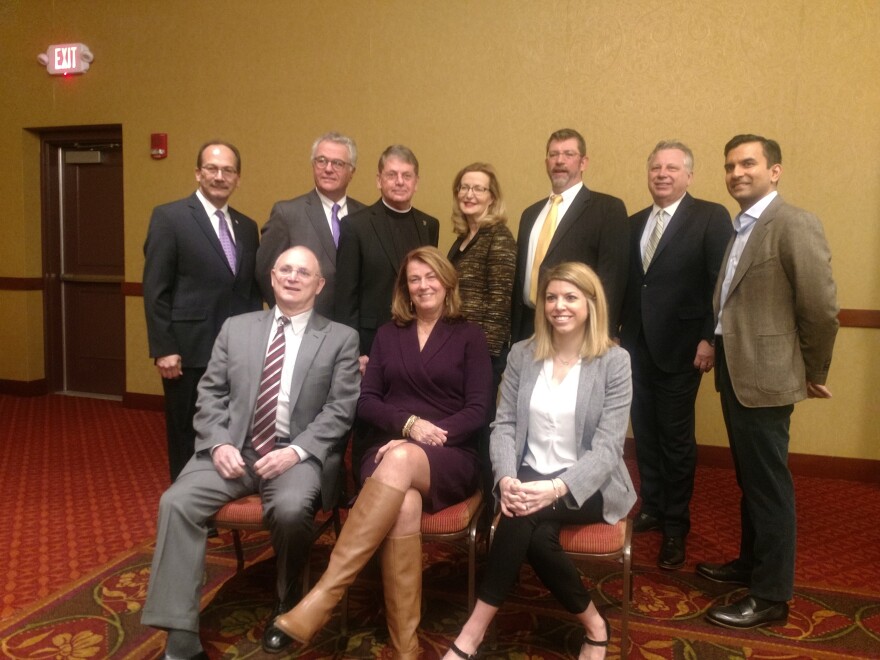Five regional college presidents gathered Wednesday to discuss the impact of higher education on the Capital Region economy.
The Rensselaer County Chamber of Commerce invited the heads of area colleges to discuss the new federal tax law, immigration and key factors that affect education and local campuses. The event in Troy also brought together business leaders, college staffers and community members. The panel was made up of Dr. James Baldwin of Excelsior College, Brother Edward Coughlin of Siena College, Dr. Andrew Matonak of Hudson Valley Community College, Dr. Havidán Rodríguez of UAlbany, and Dr. Carolyn Stefanco of The College of Saint Rose. Although invited, Dr. Shirley Jackson of RPI and Dr. Christopher Ames of The Sage Colleges were unable to attend.
The discussion began with the tax law and its impact on federal and state funding. UAlbany’s Rodríguez:
“It makes us think much more holistically about our funding strategies and so when one gives we have to really work hard at another so that we ensure that we continue to balance our books that we continue to make higher education affordable to our students, and the focus is particularly in philanthropy in focusing in generating funding for scholarships and fellowships that allow our students access to higher education,” said Rodriguez.
With student debt surpassing $1.2 trillion nationally, the college presidents were asked how they are working to make education affordable. St. Rose has been undergoing controversial curriculum and staffing changes in hopes of balancing its books. Dr. Carolyn Stefanco:
“We gathered the data, we closed very low-enrolled programs and we’ve started lots of new programs based on business plans which we have taught all of our faculty to create. We brought in consultants, and you know not surprisingly at first there was resistance to that. But now everyone is on board with the fact that we had to do that, because we want to be serving your needs. We want to be serving the needs of our students and of course the marketplace,” said Stefanco.
Dr. Baldwin says Excelsior College is taking a more liberal approach to transfer credits. He said this allows students to use their experiences to graduate faster.
“Many of our students will have had experience at other accredited institutions that they will transfer into Excelsior College. There is an economy associated with that. We also have a program that where we will evaluate the professional development plans at very businesses provide to their employees, and when it is appropriate we will award college credit for that,” said Baldwin.
The conversation then turned to immigration. In the past year, by some reports, international enrollment in the U.S. has dropped by nearly 40 percent. The panelists were asked about the impact the debate and immigration policies are having on their institutions. Dr. Stefanco of St. Rose showcased the college’s diversity efforts. She said international students account for 4 percent of the student population.
“We started in addition to the very large American flag that is on our stage for commencement each year. We started having a flag on the stage to represent every country of a student who is graduating if they are an international student. This year we will have 62 flags,” said Stefanco.
Dr. Rodríguez said UAlbany wants to spread its international reach. He said 8.5 percent of the student body is international.
The 90-minute panel ended with a discussion about the country’s political divide. Dr. Matonak of Hudson Valley Community College:
“Leadership comes at every level and it comes from us, it comes for all of you and I think that it is important for all of us to be able to open ourselves up as well as our kids to be able to understand and to be receptive to different perspectives,” said Matonak.



